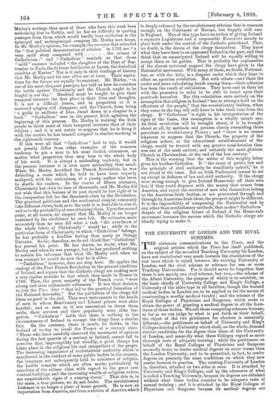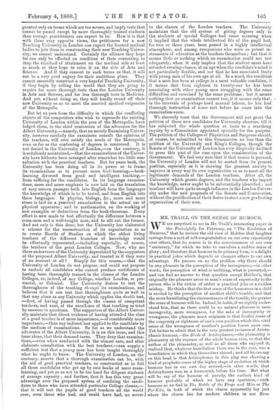THE UNIVERSITY OF LONDON AND THE RIVAL SCHEMES.
THE elaborate communications to the Times, and the original articles which the Times has itself published, on the subject of the so-called Teaching University for London, have not contributed very much towards the elucidation of the real issue which is raised between the existing University of London, and the rival scheme or schemes for one or more Teaching Universities. For it should never be forgotten that there is not merely one rival scheme, but two,—the scheme of the Albert University, the purpose of which is to establish, on the basis chiefly of University College and King's College, a University of the older type in all faculties, though the learned medical bodies in London are to be applied to for the means of constructing a worthy medical faculty ; and the scheme of the Royal Colleges of Physicians and Surgeons, which seeks to obtain the power of granting a medical degree to all the licen- tiates of those bodies. We call these competing schemes because, so far as we can judge by what is put forth on their behalf, the object of the two petitioners for charters is essentially different,—the petitioners on behalf of University and King's Colleges desiring a University which shall, on the whole, demand stricter conditions for the degree than those of the University of London, and assuredly what these Colleges regard as more thorough tests of adequate training ; while the petitioners on behalf of the Royal Colleges of Physicians and Surgeons avowedly desire to confer medical degrees on easier terms than the London University, and to be permitted, in fact, to confer degrees on precisely the same conditions on which they now confer licences to practise. The existing University of London is, therefore, attacked on two sides at once. It is attacked by University and King's Colleges, and by the advocates of what is called a Teaching University, because its degrees are obtained without what those bodies consider to be adequate tests of mental training ; and it is attacked by the Royal Colleges of Physicians and Surgeons because its medical degrees are
granted only on terms which are too severe, and imply tests that cannot be passed except by more thoroughly trained students than average practitioners can expect to be. How it is that with these very opposite views, the petitioners for a new Teaching University in London can expect the learned medical bodies to join them in constructing their new Teaching Univer- sity, we cannot understand. Certainly the alliance they hope for can only be effected on condition of their consenting to drop the standard of attainment on the medical side at least as much as they hope to raise it on the side of Arts and Science. And if they consent to such terms as that, it will not be a very good augury for their ambitious plans. They cannot assuredly construct a very hopeful Teaching University, if they begin by telling the world that they are going to require far more thorough tests than the London University in Arts and Science, and far less thorough tests in Medicine. And yet, without doing so, they will hardly round off their new University so as to meet the asserted medical exigencies of the Metropolis.
But let us pass from the difficulty in which the conflicting objects of the competitors who wish to supersede the existing University of London within the area of the Metropolis, have lodged them, to the chief contention of the advocates for the Albert University,—namely, that no merely Examining Univer- sity, however carefully the examiners consult the opinions of the teachers, will ever satisfy the needs of the Metropolis, even as far as the conferring of degrees is concerned. It is not denied in the University of London,—on the contrary, it is sedulously maintained,—that the examinations of the Univer- sity have hitherto been arranged after somewhat too little con- sultation with the practical teachers. But for years back, the University has been doing all in its power so to frame its examinations as to prevent mere book-learning,—book- learning divorced from good and intelligent teaching,— from sufficing for the candidates. In its language examina- tions, more and more emphasis is now laid on the translation of easy unseen passages both into English from the languages the knowledge of which is to be tested, and from English into those languages. In physics, biology, &c., more and more stress is laid on a practical examination in the actual use of physical apparatus ; and in mathematics, on the working of new examples or deductions from the book-theorems. Every effort is now made to test effectually the difference between a cram-man and a well-taught man, and to sift out the former. And not only is this done, but the University has elaborated a scheme for the reconstruction of its organisation so as to create Boards of Studies on which the ablest living teachers of the different branches of knowledge would be effectually represented,—including especially, of course, the teachers of the great London Colleges. Now, why are these endeavours of the University depreciated by the supporters of the proposed Albert University, and treated as if they were of no account at all Simply for this reason,—that the University of London do not propose, and could not propose to exclude all candidates who cannot produce certificates of having been thoroughly trained in the classes of the London Colleges, or, indeed, of any College, whether London, or pro- vincial, or Colonial. The University desires to test the thoroughness of the teaching through its examinations, and believes that it can test that thoroughness quite as well in that way alone as any University which applies the double test, —first, of having passed through the classes of competent teachers, and next, of the excellence of that teaching as tried by answers to questions. The supporters of the Albert Univer- sity maintain that direct evidence of having attended the class of a good teacher is of more importance,—of considerably more importance,—than any indirect test applied to the candidate by the medium of examinations. So far as we understand the advocates of the Albert University, it is on this issue, and this issue alone, that their demand turns. They deny that examina- tions,—even when conducted with the utmost care, and after elaborate consultation with the best teachers,--can supply a sufficient test that a young man has been taught thoroughly what he ought to know. The University of London, on the contrary, asserts that a thorough examination can be, with the aid of good practical teachers, so constructed as to foil all those candidates who get up by rote books of mere cram- learning, and yet so as not to be too hard for diligent students of average capacity ; and further, that it has this very great advantage over the proposed system of confining the candi- dates to those who have attended particular College classes,— that it will test the pupils of good teachers all the world over, even those who had, and could have had, no access to the classes of the London teachers. The University maintains that the old system of giving degrees only to the students of special Colleges had some meaning when it implied that the whole intellectual life of the pupil had, for two or three years, been passed in a highly intellectual atmosphere, and among companions who were as potent in- struments of education as the teachers themselves ; but that it means little or nothing which an examination could not test adequately, when it only implies that the student must have attended evening-classes, at an age when the candidate's mind is not particularly flexible, and not that he has associated freely with young men of his own age at all. In a word, the condition that a man has been at college is a most valuable condition, if it means that from eighteen to twenty-one he has been associating with other young men struggling with the same difficulties and exercised by the same problems ; but it means nothing that an examination cannot test, if it means only that, - in the intervals of perhaps hard manual labour, he has had thorough instruction of some sort before he came into the examination-room.
We sincerely trust that the Government will not grant the petition of those new candidates for University charters, till it has subjected the whole question at issue to a searching inquiry by a Commission appointed specially for the purpose. The petition of the Colleges of Physicians and Surgeons should, of course, be submitted to this Commission no less than the petition of the University and King's Colleges, though the Senate of the University of London has very illogically declined to press this part of the case upon the consideration of the Government. We feel very sure that if that course is pursued, the University of London will not be ousted from its present position, especially as it is showing the greatest anxiety to improve in every way its own organisation so as to meet all the legitimate demands of the London teachers. After all, the University which grants degrees, and the teachers who impart the knowledge, never ought to be substantially identified ; and teachers will have quite enough influence in the London Univer- sity under the new proposals of the Senate and Convocation, without the gratification of their desire to start a new graduating organisation of their own.



































 Previous page
Previous page